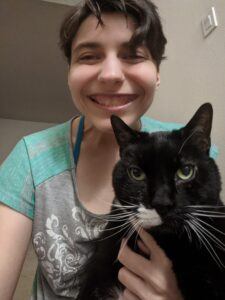College drop-out.
At the height of my anxiety, depression, and inner turmoil, I struggled to take care of myself, let alone do something as demanding as learning and participating in academics.
Despite having gone to see therapists, cycling through medications, and buying a shelf’s worth of self-help books, I was floundering, barely able to keep my head above the darkness that threatened to swallow me whole.
In the fall of 2015, I dropped out, convinced that I just couldn’t get a degree. Things were bad. Really bad. My family’s situation, my mental state of being. I was too young to understand what was going on, but you don’t have to be any particular age or mental maturity to be affected by the stress that permeates the air like a miasma.
I felt distraught and hopeless. I blamed myself for just not being good enough. I knew with finality that there would be no one to save me from myself. So I had to pull myself up by my bootstraps. Reluctantly, that’s exactly what I tried to do.
I learned how to pick myself up, and that’s a skill I practice every time depression strikes, and my mind brings me back to that same place that I was when I was younger: lost, scared, and in agony.
I didn’t recognize it at the time and wouldn’t realize until several years later (not too long ago, in fact) that the skills I pieced together were reminiscent of Dialectical Behavior Therapy (DBT) strategies. It started with a promise I made to myself, at least within my journal: I would no longer admonish or scold myself.
I didn’t keep my promise. I’ve broken it many times since then. It ultimately didn’t matter, though, because something much more important was seeded: a determination and willingness to understand myself.
In DBT terms, it’s called distress tolerance. I simply saw it as coming to understand reality. The reality is that diagnoses aside, I had gone through some traumatizing and awful stuff as a kid. Those experiences sink into your heart and stick with you as you grow up.
To be affected by those things and have them drag you down, reducing your ability, isn’t at all unusual or wrong. It’s quite normal—you only have to look at reality as evidence. It’s not what people say about you or to you or what they think you should do; it’s how you and all the people who have had those difficult experiences are affected today.
When you’re used to thinking of yourself as being “wrong,” it can be incredibly difficult to accept that your baggage inevitably weighs you down. Especially when people around you keep telling you you just “need to have more self-control” or “you’re just lazy” and attack your very being.
Yet, I was able to discover how freeing this technique of distress tolerance truly was. When you allow yourself room to experience those negative emotions, they become less crushing. When you absolve yourself of some of the blame, the weight is lifted off your shoulders.
To realize that you don’t need to be what others and you are telling yourself you “should” be, but that you can simply start right from where you are is a tremendous relief—and incredibly empowering. When you repeatedly remind yourself of this every time you start to feel control slipping away from you due to your emotions, it helps ground and reorient you. You start to see yourself differently, too.
Of course, there’s a caveat that comes with this: you need to accept that you won’t get the benefits of the lofty goals you had before. However, this is only a temporary setback.
Another part of DBT is emotion regulation, and while it’s separate from distress tolerance, I found that using distress tolerance helped a lot with emotion regulation. To put it simply, distress tolerance helps you recognize that your emotions are out of whack and a result of faulty biochemistry rather than a reflection of your reality. This realization helps with emotion regulation, which is the ability to navigate those emotions rather than letting them control you.
When I practiced emotion regulation, I realized that the situations that used to distress me started to affect me less and less. When stressful situations lose their emotional charge, you can endure them better and for longer. Eventually, you can even get to a point where those previously stressful situations don’t bother you at all.
I tell you, these experiences had me feeling like I had a new lease on life. When you accept that your limits are less than what you previously thought they were, you can actually go through a transformation. Your limits eventually exceed what you previously thought they were, and you’ll be less stressed than if you simply continue to push yourself.
Think about how your life would be different if you didn’t feel paralyzed by fear when you’re presenting. Or if you didn’t feel anxious when promoting yourself. Or if you could simply enjoy the process of doing a large project without stressing over the deadline and doing everything right.
How would that change things for you? I’ll tell you how they changed things for me:
I went back to college, and I graduated with a 3.8 GPA in Computer Science. I hold a full-time job as a Software Engineer, and I’m financially supporting not only myself but my wonderful disabled boyfriend and two elder cats.
I transformed from a college drop-out into a… well, at least somewhat passing as a functional adult. And I’m addicted to self-improvement. I don’t intend to stop until I’ve attained financial freedom.
The words I’ve never before dared to hope of are now my driving passion. Far from feeling helpless, these techniques helped me discover how unlimited I really am. It’s not magic, abstract information, or some stroke of luck…
But simply a way of thinking that anyone can practice. That you can also benefit from…
And change your life in ways you never imagined were possible.

Photo by Brooke Cagle on Unsplash
The opinions and views expressed in any guest blog post do not necessarily reflect those of www.rtor.org or its sponsor, Laurel House, Inc. The author and www.rtor.org have no affiliations with any products or services mentioned in the article or linked to therein. Guest Authors may have affiliations to products mentioned or linked to in their author bios.
Recommended for You
- The Truth about Relapse in Addiction Recovery - April 14, 2025
- The Power of Peer Support in Mental Health Recovery - April 10, 2025
- Artificial Intelligence in Anxiety Management: How AI Helps Users Cope with Anxiety Symptoms - April 3, 2025





